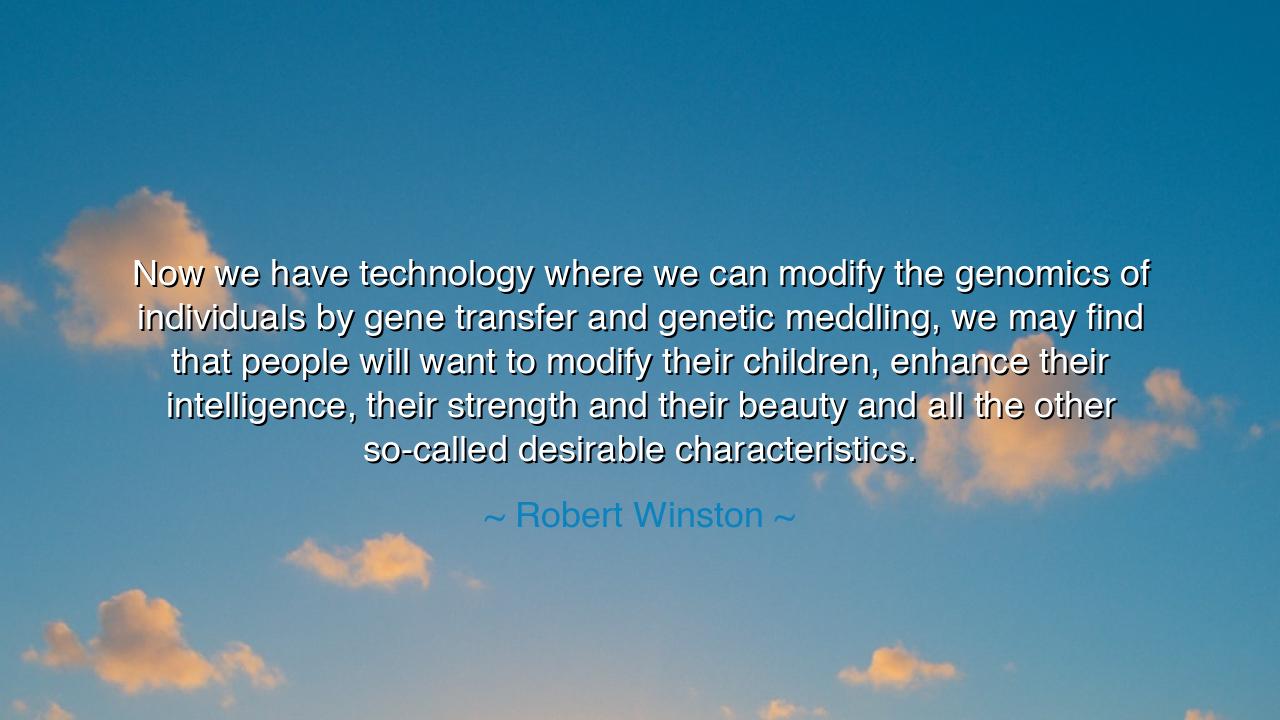
Now we have technology where we can modify the genomics of
Now we have technology where we can modify the genomics of individuals by gene transfer and genetic meddling, we may find that people will want to modify their children, enhance their intelligence, their strength and their beauty and all the other so-called desirable characteristics.






“Now we have technology where we can modify the genomics of individuals by gene transfer and genetic meddling, we may find that people will want to modify their children, enhance their intelligence, their strength and their beauty and all the other so-called desirable characteristics.” Thus spoke Robert Winston, a scientist and thinker of our age, warning humanity at the crossroads of creation. His words are not the cry of fear, but the solemn reminder of a power newly kindled in mortal hands—the power to shape life itself. In this quote, Winston gazes beyond the laboratories and microscopes to the deeper moral question: what will we do, now that we can play with the very code of our existence?
For countless ages, humankind could only dream of altering fate. The genome, that sacred script written into every living cell, was a mystery beyond comprehension. But with the coming of the biotechnological age, the veil has been torn away. Through gene transfer and genetic engineering, scientists have learned to mend the broken strands of life, to heal diseases once thought incurable, and even to foresee the traits of future generations. Yet, as Winston warns, this power does not end with healing—it tempts us to enhance, to design life not in the image of nature, but in the mirror of our desires.
The ancients spoke of a similar peril, though in mythic form. They told of Prometheus, who stole fire from the gods and brought it to men. His gift illuminated the darkness but also unleashed suffering, for humankind, untempered by wisdom, would use that fire both to build and to burn. So too does genetic manipulation stand as our modern fire—an emblem of both creation and destruction. We can cure a child of blindness, but will we next choose to create one with eyes of perfect color? We can spare the weak from pain, but will we then decide who deserves to be born strong? The line between medicine and meddling grows ever thinner, and on that line walks the soul of our civilization.
Winston’s warning is not against progress, but against hubris—that ancient sin of pride that brings ruin to the wise and the foolish alike. He reminds us that when humanity begins to act as creator, it must also bear the responsibility of creation. For every manipulation of life carries unseen ripples: not only in the body, but in the heart and the spirit. If beauty and intelligence become commodities to be designed, what becomes of virtue, of compassion, of the natural diversity that gives life its meaning? The danger is not in the machine, but in the motive.
We have already seen glimmers of this in our history. In the twentieth century, nations sought to engineer not genes, but societies—pursuing the illusion of perfection through eugenics and ideology. What began as a pursuit of purity ended in horror and loss. Humanity learned then that the attempt to shape perfection often destroys what is human. Winston’s words echo that lesson: technology is not the enemy, but unexamined ambition is. Without moral vision, our inventions become instruments of vanity and division rather than healing and hope.
Yet there is also greatness in his warning, for it calls us not to fear science but to govern it with wisdom. The ancients taught that power and virtue must walk hand in hand, lest one consume the other. As we enter an age where genes can be edited like words in a book, we must become not only better scientists, but better philosophers, better guardians of life. To create is divine—but to create wisely is what makes us human.
Therefore, my children of the future, take this counsel to heart: seek knowledge, but wed it to conscience. Let compassion be the compass of your discoveries. When you hold in your hands the power to alter life, remember that every strand of DNA is a poem written by time and trial, and not to be rewritten lightly. Celebrate the miracle of imperfection, for it is through difference that empathy is born. Use science to heal, not to dominate—to liberate, not to define. For in the balance between creation and humility lies the enduring greatness of mankind.






AAdministratorAdministrator
Welcome, honored guests. Please leave a comment, we will respond soon